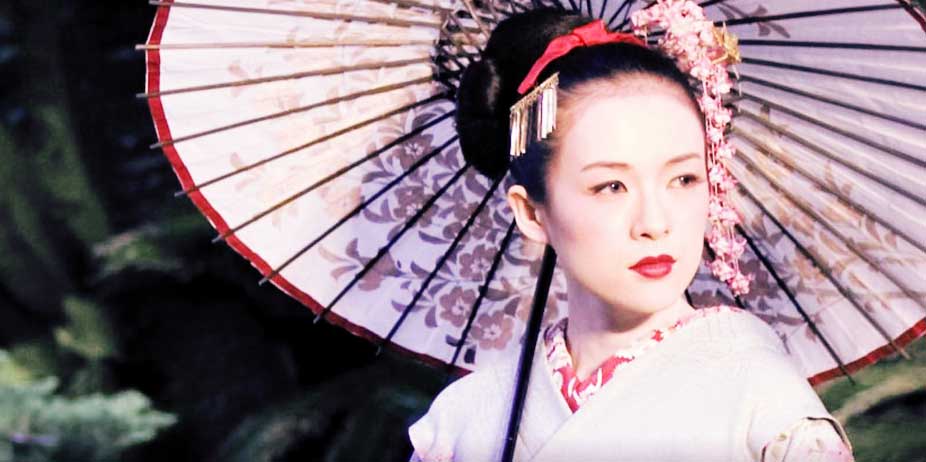 Memoirs
of a Geisha (2005)
Memoirs
of a Geisha (2005)
Memoirs of a Geisha is a memorable and fascinating film. It has its unforgivable faults but deep down tells a story about both beauty and hideousness, a culture that has been all but forgotten in the modern world.
Torn from her sister's arms and sold into the intimidating household of a geisha, Chiyo (Suzuka Ohgo) struggles to adopt to her new surroundings. Her parents have died and left her orphaned and her attempts to escape with her older sister are thwarted through an accident. Possessed of rare and beautiful blue eyes, signifying a strong and unwavering temperament, her elders believe that Chiyo has vast potential. This earns her the unforgiving hatred of Hatsumomo (Li Gong), who hopes to one day come into a position of power as the next "Mother" of the house. Geishas gather the affection and approval of men not through prostitution but entertainment. They dance and play instruments, pour tea, and are all about elegance and beauty, like a moving portrait. Manipulated into involvement in a crime against a rival geisha, Chiyo is punished by becoming enslaved to the house and banished from the school, but a stranger's kindness in the marketplace reignites her ambitions.
A businessman (Ken Watanabe) finds her weeping in the street and purchases her sweets. His kindness makes an impression on the little girl, who determines one day that she will become a geisha so she might enter his world. Six years later, the head of a rival house agrees to pay for Chiyo's education, making a wager that she will become the most famous entertainer in all of Japan. Their secret ambitions are to displace Hatsumomo. As she learns to dance and charm men with intelligent conversation and alluring glances, Chiyo (Ziyi Zhang) comes to the ultimate realization that her newfound ambitions will require unhappiness, rivalry, and sacrifice, for as a geisha, she is not allowed to fall in love. This film is nothing if not exquisitely filmed, for there is subtle beauty in every frame. The sight of geishas in silk kimonos moving through falling cherry blossoms is a sharp contrast with the dark hues of the film's early scenes, when Chiyo is literally torn from her family's arms.
The culture surrounding geishas is filled both with beauty and hideousness, liberation and repression, and the director has done a magnificent job luring us into his world. The characters seem to have many sides to them. Not all are what they seem. If the film has one problem it seems to be its running length, which seems a little taxing as we draw near to the end. I found it very stirring and at the same time rather sad, because it reveals the emptiness of such a life. Geisha are made to be beautiful, to lock away their hearts, and as Chiyo says, "to hide their misery behind painted faces." It serves as a powerful reminder that a life without Truth is meaningless. While the director showed restraint in some areas, others could have used a bit more censorship. Language is limited to a single use of "b*stard," and most of the violence consists of girls throwing one another to the ground and clawing at each other's faces. A girl is severely beaten with a cane, and we hear her cries from another room. A fire is set by accident and then purposefully spread by an angry and vengeful geisha, endangering the lives of her sisters. The most disturbing scene of violence involves a man forcefully removing Chiyo's clothes. The audience fears he intends to rape her, but he only wanted to see her body. The intensity of the depiction leaves the emotional impression that you witnessed a rape. We see her bare back as she crumples to the floor.
Another woman's bare back is shown in a public bath house, and on a child. Hatsumomo is shown briefly having sex with a forbidden lover; the mother of the house examines her for evidence (implied). While it is made very clear that geisha sell their charms and not their bodies, a large portion of the film is devoted to the sub-plot of the auctioning off of Chiyo's virginity. Her mentor uses veiled illusions to reference sex and takes bids, ultimately gaining a high price because of her student's beauty. Hatsumomo spreads vicious lies about Chiyo, implying that she is promiscuous, when she herself is at fault. Chiyo sleeps with the man who bid the most for her, but the scene only shows her laying down on the floor. She is asked to help encourage an American businessman to invest with Japanese tradesmen. It becomes clear that he expects her to sleep with him and she does so with reluctance. (This scene is fairly graphic.) It's uncertain whether or not a group of geishas are topless in a natural pool as they share the company of men.
The film leaves audiences with a lot to think about but could have toned down the sexual aspect. That was emotionally devastating (because in each situation, Chiyo was mentally forced into compliance) and undermined the beauty of the rest of the film.
